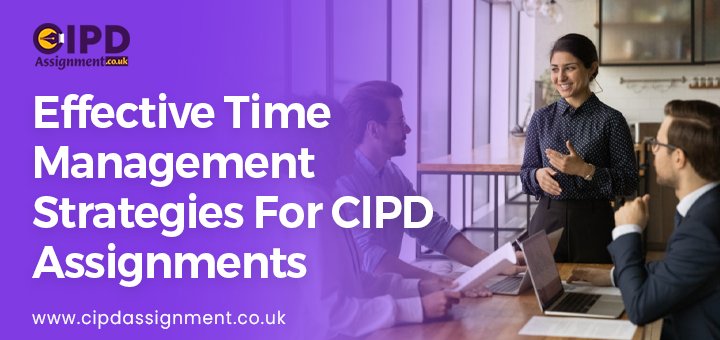Main body
To effectively manage CIPD assignments, one must strike the correct balance between job, study, and leisure. Here are some crucial time-management pointers specifically for CIPD students to help them complete their assignments effectively and on time:
Learn About the Requirements
Before starting a CIPD project, you need to be aware of a few factors. The parameters of the work, the necessary resources, and your teachers’ criteria must all be seen. If you have a solid understanding of the required background knowledge, the assignment process will go more easily.
Establish Reasonable Deadlines
Effective time management requires thorough planning. You can attain focus and clarity in your work by organizing assignments, due dates, and procedures thoroughly. You’ll be able to maximize your time with this strategy because it will let you spend more time working and less time worrying.
Utilize Time-Saving Techniques
Utilize time-saving strategies to complete your cipd assignments as soon as possible. Cipd assignment help can help you save time and effort while producing excellent outcomes. Give it to the CIPD assignment help UK—they are well-versed in CIPD regulations and best practices—so you can devote more of your time to other crucial assignments for work or school.
Decide What Matters Most to You
The ability to identify priorities is essential for effective time management. Setting work priorities based on importance and due date is the first step. Put off finishing the less important tasks until later and devote all of your focus to the ones that will help you reach your goals the quickest.
Cut Down on External Distractions
Turn off notifications, find a quiet place, and let people close to you know that you need privacy to focus better. Cutting out outside distractions helps you focus better and manage your time more effectively. 5. Take pauses
Take Pauses
Create yourself a proper job and study schedule, then also allow time for self-care. 25 minutes of focused work followed by a five-minute break is the Pomodoro technique try it. The logic behind this strategy is that you can concentrate better if you know there will be a break. Remember to take the breaks as well when you are settling back down. Stand up and stretch, take a short walk, or make some coffee.
Work on Saying no
It’s hard to say no, but saying it is important because you need to protect your physical body and emotions as well as avoid the stress of overloads. Be proactive: Inform supervisors and colleagues of periods when things are going to be hectic, respectively turn down additional work if you think your plate is full. When at all possible, assign tasks to others; this will not only free up your time but also give them a sense of productive contribution.
Tips for Effective Writing
Arrange it
There is always a deadline, and the entire process needs to be planned out at the outset. If you have two tasks, divide the total time allotted into two sections based on what each work requires. Make sure you are adhering to the plan after that. Treating yourself to a reward of some kind when you finish each task is a good way to stay consistent with the timetable.
Read Several Times
Reading the assignment and the instructor’s requirements several times will help you better understand the material. You will be able to find the smallest elements that will ultimately aid you in creating the ideal assignment the more you study the content.
Take Sketchy Note
Taking rough notes is a great way to get information. Make rough notes at the beginning of the assignment for each part to aid in your critical analysis and mental process.
Observe the Real Specifications
Verify that you are meeting the standards correctly and are not going overboard. To avoid having to spend a lot of time in the end adjusting the total count by omitting too many words, the word count should be kept from the beginning of the writing.
Edit and Proofread
After finishing the first draft, proofread it to make sure all spelling and grammar are correct. In order to ensure that the final draft of the document is flawless and increases your chances of becoming CIPD qualified, you must also review the material and sentence patterns throughout the revision phase.
References and Plagiarism
Make sure all information drawn from external sources is properly attributed and that there is no plagiarism in the text. Create a reference list that is appropriately organized for the checker’s convenience.
